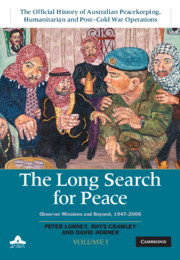Book contents
- The Long Search for Peace
- The Official History of Australian Peacekeeping, Humanitarian and Post–Cold War Operations
- The Long Search for Peace
- Copyright page
- Contents
- Maps
- Preface
- Glossary
- Part 1 Actor and observer
- Part 2 New ambitions
- 16 The new internationalists
- 17 A ‘lop-sided’ umpire
- 18 Snow Goose and the Milk Run
- 19 An island divided
- 20 Desert sortie
- 21 On the Golan
- 22 Witnesses to civil war
- 23 Fumbling the political football
- 24 The tribe that lost its head
- 25 Into Africa
- 26 A dangerous but crucial mission
- 27 The healing touch
- 28 ‘The only show in town’
- Part 3 Carrying on
- Conclusion
- Book part
- Bibliography
- Index
- Plate Section (PDF Only)
20 - Desert sortie
United Nations Emergency Force II, 1976–79
from Part 2 - New ambitions
Published online by Cambridge University Press: 27 September 2019
- The Long Search for Peace
- The Official History of Australian Peacekeeping, Humanitarian and Post–Cold War Operations
- The Long Search for Peace
- Copyright page
- Contents
- Maps
- Preface
- Glossary
- Part 1 Actor and observer
- Part 2 New ambitions
- 16 The new internationalists
- 17 A ‘lop-sided’ umpire
- 18 Snow Goose and the Milk Run
- 19 An island divided
- 20 Desert sortie
- 21 On the Golan
- 22 Witnesses to civil war
- 23 Fumbling the political football
- 24 The tribe that lost its head
- 25 Into Africa
- 26 A dangerous but crucial mission
- 27 The healing touch
- 28 ‘The only show in town’
- Part 3 Carrying on
- Conclusion
- Book part
- Bibliography
- Index
- Plate Section (PDF Only)
Summary
Until the Middle East descended into its fourth major war in a quarter of a century, 1973 had been more or less like any other year for Australia’s observers with the UN Truce Supervision Organization (Untso). On Anzac Day, they conducted a dawn service at the Mount Scopus war cemetery, overlooking the ‘misty orange-coloured’ Old City of Jerusalem. Beside the wreaths they laid a sheaf of oats for the horses of the 10th Light Horse Regiment, which the senior Australian, Lieutenant Colonel Keith Howard, had once commanded. Observers and their families often found the petty hardships and shortages of life in the Middle East frustrating, but for many they were outweighed by the heady mix of history, archaeology, culture and politics that the region offered.
- Type
- Chapter
- Information
- The Long Search for PeaceObserver Missions and Beyond, 1947–2006, pp. 505 - 531Publisher: Cambridge University PressPrint publication year: 2019

